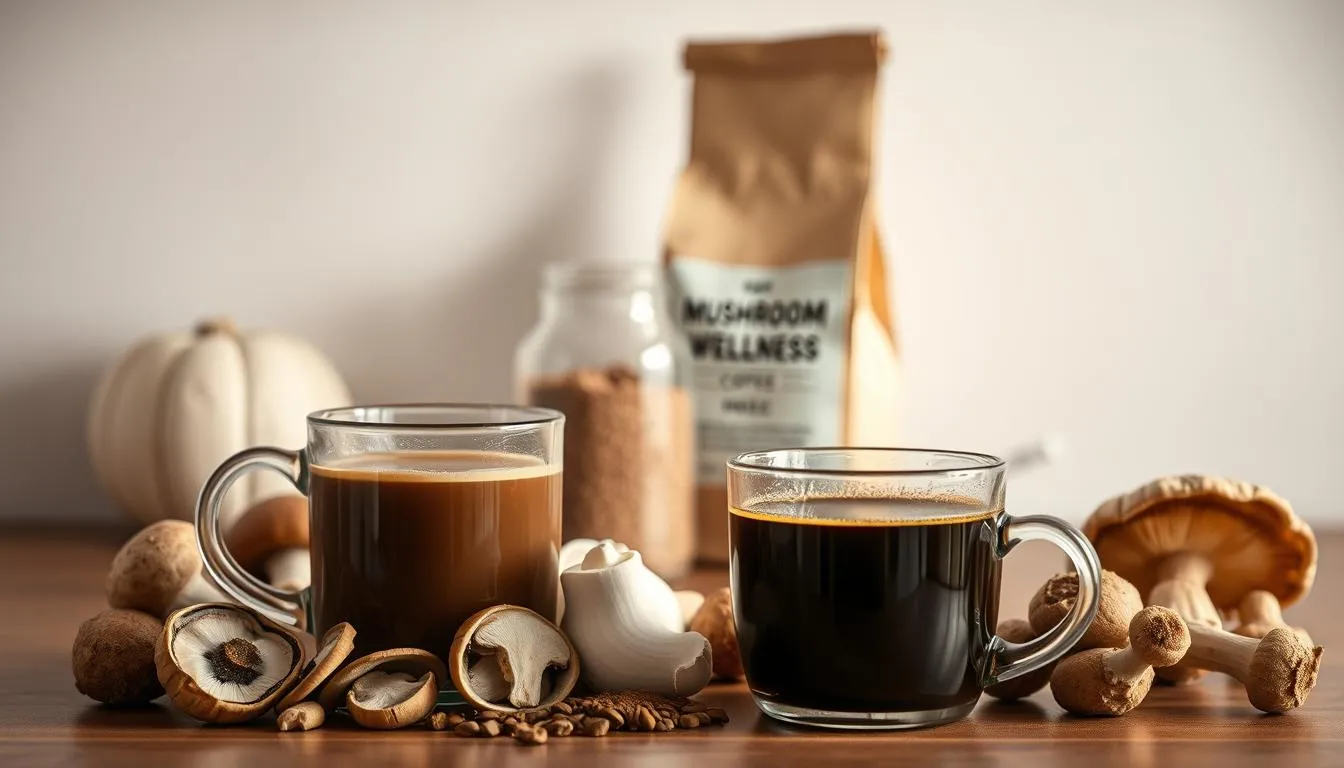Have you ever wondered if a simple cup of coffee or a morning capsule could quietly change your day? I remember feeling hopeful and skeptical when I first saw powders and teas promise clearer focus and calmer moods.
Today these products are everywhere — in health stores and online across the United States. Influencers and brands point to improved focus, memory, and longevity, but careful research shows most evidence still comes from animal or cell studies. A few human trials exist, like one RCT suggesting lion’s mane may slow cognitive decline over time.
Whole food versions deliver prebiotic fibers called beta-glucans that support the microbiome and steady blood sugar. That practical baseline matters whether you try a powder, coffee mix, or a capsule.
Key Takeaways
- These supplements are trending, but human research is limited.
- Whole food mushrooms give fiber and beta-glucans for gut and blood sugar support.
- Look for third-party tested products (USP or NSF) and consult your provider.
- Approach claims with patience and realistic expectations over time.
- This guide is beginner-friendly and not medical advice.
Beginner’s snapshot: why mushrooms are having a wellness moment right now
In recent years, mushroom-infused coffee and quick snacks have moved from niche shelves into mainstream stores and menus.
More people now spot coffee blends, gummies, and bars that include mushroom extracts. Health outlets and retailers note this steady rise. Whole Foods’ product leads and TODAY.com sources report the same shift.
A lot of the appeal is simple: these products promise natural support for energy, focus, stress relief, and immune care. Many shoppers like plant-forward, clean-label options. That makes it easy to fold a new item into daily routines.
Experts remind readers that the science is still catching up. Most studies are limited, so dramatic results are unlikely overnight. Take time to read labels and check quality before buying multiple items.
Quick starter tip: try a single coffee alternative from a local store or café to test taste and tolerance before committing.

| Product type | Where you find it | Good first try |
|---|---|---|
| Coffee blends | Cafés, grocery store | Single-serve mix |
| Powders & teas | Wellness aisles, cafés | Small jar or sample |
| Gummies & bars | On-the-go sections | One package |
What are functional mushrooms? A friendly primer for first‑timers
Some varieties are eaten for flavor and fiber, while others are sold for possible wellness effects beyond basic food value.
Functional vs culinary: nutrients, beta‑glucans, and adaptogenic claims
Everyday grocery fungi—like button or portobello—bring proven nutrition: B vitamins, minerals, and true dietary fiber.
By contrast, a functional mushroom is promoted for effects beyond those basics. Whole forms often contain beta‑glucans, a type of prebiotic fiber linked to a healthier microbiome and steadier blood sugar.

“Adaptogenic” explained: stress support vs proven outcomes
The label adaptogenic suggests a product may help the body respond to stress. Experts warn this word is more traditional and marketing than a clinical guarantee.
Think of it as a historical claim with varying modern evidence depending on the species and preparation.
Roots in global traditions
Many species—reishi, chaga, cordyceps, and lion mane—have been used in medicine and food for more than 2,000 years in systems such as Traditional Chinese Medicine and Indigenous practices worldwide.
Important note: these wellness products are not psychedelic. They do not contain psilocybin and have no hallucinogenic effect.
“Start by deciding whether you want culinary enjoyment, possible functional support, or both, then choose formats that fit your daily routine.”
| Feature | Culinary mushrooms | Wellness varieties |
|---|---|---|
| Typical use | Cooking, nutrition | Supplements, powders, teas |
| Key benefits | Fiber, vitamins, minerals | Beta‑glucans, traditional adaptogenic claims |
| Evidence level | Well established | Mixed; more animal and small human studies |
| Mind‑altering risk | No | No |
- Beginner tip: try cooking with grocery types for nutrition, and sample one wellness product at a time.
- Many people find powders like lion mane convenient, but whole food intake still adds fiber and real nutrition.
What the research really says today
Science shows promise, but the picture is mixed. Much of what we know comes from cell and animal work that maps possible mechanisms. Human trials are smaller and fewer, so conclusions remain cautious.
Promising findings and real limits
Evidence is encouraging, not definitive. A 2020 randomized, double‑blind trial found that daily lion’s mane capsules over 49 weeks slowed cognitive decline in people with mild Alzheimer’s compared with placebo. That result suggests potential but is not a cure and may not apply to everyone.
Reviews in journals call clinical findings “encouraging” while warning about varied doses, preparations, and lack of standardization across studies. Small sample sizes and short follow‑up mean larger trials are needed to confirm effects.
Supplements vs whole foods: fiber, microbiome, and blood sugar
Whole edible mushrooms reliably deliver beta‑glucan fiber that supports gut diversity and helps moderate blood sugar rises. Processing can reduce these fibers, so some supplements may not give the same nutritional benefit.
The U.S. Food and Drug Administration does not pre‑approve supplement claims. That means quality varies and independent verification matters when you shop.

“Track what you try and give it time—any subtle changes often show up over weeks or months, not overnight.”
- Most mechanisms come from lab and animal studies; human trials are limited.
- Notable human trial: lion’s mane, 49 weeks, slower decline in mild Alzheimer’s.
- Standardization matters: extraction, dose, and quality affect outcomes.
- Whole food intake supports the microbiome and blood sugar better than some processed supplements.
- Because of regulatory gaps, choose brands with third‑party testing and track personal responses.
Functional mushrooms and their potential benefits
Different species bring different strengths. Some people aim for clearer focus, others look for calmer sleep or extra energy. Knowing which option targets your goal helps you test results more clearly.
Lion’s mane: focus, memory, and emerging cognition research
Lion’s mane is the go-to for people chasing focus and memory support.
One 49-week randomized trial in mild Alzheimer’s suggested slower cognitive decline versus placebo. That early human data is promising but not conclusive.
Try lion mane in morning drinks and track changes over weeks, not days.
Reishi: stress, relaxation, and sleep support
Reishi is often used as a gentle evening companion to support relaxation and sleep routines.
Traditional use points to calming effects, yet strong clinical proof is limited. Many users sip reishi tea before bed to see if it helps their nightly routine.
Cordyceps: energy, stamina, and athletic performance
Cordyceps is popular among active people for perceived energy and stamina gains.
Evidence is mixed and still emerging, but some athletes report better endurance when they use cordyceps before workouts.
Chaga and turkey tail: antioxidants, immunity, and gut health
Chaga is chosen for antioxidants and skin or immune interest and is common in teas and extracts.
Turkey tail contains polysaccharides under study for gut and immune system interactions. Researchers are exploring its role in microbiome support.
Remember: immune and nervous system claims are still being validated. Interpret benefits as possible, not guaranteed.
Practical tip: focus on one function at a time—cognition, relaxation, or energy—and pair any trial with good sleep, hydration, and balanced meals to get the clearest read on what may help.
How to use them: forms, doses, and realistic expectations
Start by picking a single form you’ll actually use every day—consistency beats complexity.
Powders, extracts, capsules, teas, and coffee: what beginners should know
Popular forms include powder blends, concentrated extracts, capsules, tinctures, teas, and coffee mixes. Choose by convenience and taste.
Powder works well in smoothies or coffee. Capsules are tidy for travel. Extracts can concentrate specific compounds while whole‑profile powders aim for broader nutrition.
Typical daily amounts and timing
Many products list a daily range near 1,000–2,000 mg. Start at the low end and build slowly to test tolerance.
Take your chosen dose at the same time each day—morning for focus or pre‑workout, evening for relaxation—so you can fairly judge effects over weeks.
What to expect (and not)
Expect gradual, subtle changes rather than overnight results. Track focus, energy, sleep, and digestion in a simple log for 4–8 weeks.
Side effects are usually mild—think GI upset or lightheadedness. If they occur, pause and consult your provider before returning.
“Pick one goal, one product, and give it time before adding extras.”
- Practical prep: stir powder into drinks, whisk into soups, or brew a gentle tea.
- Quality tip: favor U.S.-made, organic products with clear serving sizes and storage instructions.
Safety first: quality, interactions, and U.S. guidance
Knowing how products are regulated and tested helps you choose wisely. In the United States, the food drug administration does not pre‑approve most supplements before they reach shelves. That means quality varies and buyer vigilance matters.
Supplement safety 101
Look for third‑party seals such as USP or NSF. Prefer U.S.-made, organic options when possible to lower contamination risk. Start with the lowest labeled serving and watch for GI upset, dizziness, diarrhea, dry mouth, or changes in blood pressure or blood sugar.
Who should be cautious
People on prescription medicine, pregnant or breastfeeding, or managing autoimmune, kidney, or liver conditions should check with a clinician first. Shifts in blood pressure or sugar are possible; monitor readings and share them with your care team.
Tip: consult a dietitian or pharmacist to review interactions and match choices to your health goals. Buy small sizes to test tolerance, then scale up if the product suits you.
“Natural” doesn’t always mean safe—personalized guidance protects long‑term health.
Smart shopping and practical tips for everyday wellness
A little label-reading goes a long way when choosing a supplement or powder at the store.
How to read labels: species, extract type, beta‑glucans, and dose transparency
Scan labels for the exact species name, extraction method, and a stated beta‑glucan percentage. These details tell you what is in the jar and how concentrated it is.
Check serving size and any third‑party testing seals so you know the dose and quality. If a product hides details, consider another brand.
Whole-food wins: cooking for fiber, microbiome, and blood sugar
Eating common grocery food varieties like cremini or shiitake adds real prebiotic fiber that supports gut diversity and steadier post-meal blood sugar.
Try sautéing slices with garlic and onions, or use firm varieties as a savory meat alternative in tacos and bowls to boost nutrition without fancy extras.
Easy ways to start: coffee, broths, smoothies, and budget-friendly swaps
Begin by picking one simple way to add these foods to your day. Try a mushroom coffee blend in the morning, sip a savory broth in cool weather, or stir half a serving of powder into a smoothie.
Use store staples like button or cremini as budget-friendly swaps while you test a specialty powder. Buy small sizes so you don’t waste money on formats you won’t use.
Keep it simple: one product, one goal, and four to eight weeks of tracking will show whether the change fits your routine.
- Confirm species, extraction, beta‑glucans, serving size, and third‑party testing on labels.
- Start with one reliable powder or extract to judge taste and fit before buying a lot.
- Make whole foods a core habit for fiber and blood sugar benefits.
- Ask a dietitian to match species and dose to your goals and health needs.
- Check storage instructions and expiration dates so powders and capsules stay potent.
Conclusion
A strong, evidence-aware approach helps you test what may help without overspending or chasing quick fixes.
Functional mushrooms can support focus, calm, energy, or immune balance for some people, but benefits are usually subtle and slow to appear. Start with one goal and one product—try lion mane for cognition, reishi for relaxation, or chaga or turkey tail blends for general immune interest—and track results for several weeks.
Whole mushrooms in your diet give reliable fiber for gut and steadier blood sugar, while supplements vary by quality and dose. Look for clear labels, third‑party testing, and consistent servings so any effects are easier to judge.
Research is growing but still limited. If you have health concerns or take medicines, check with your clinician and keep a simple journal of timing, dose, and how you feel. Treat these products as one part of a balanced wellness plan—sleep, movement, and nutrient-dense meals matter most.
FAQ
What exactly are these mushrooms and how do they differ from culinary varieties?
These fungi are used for health and wellness rather than cooking. Unlike common edible types, they’re often standardized for active compounds such as beta‑glucans and terpenes. Culinary species like button or shiitake are eaten for flavor and nutrition, while extracts or powders concentrate specific components for targeted uses like immune support or cognitive interest.
Can lion’s mane really help with memory and focus?
Early human trials and lab studies suggest lion’s mane may support nerve growth factors and cognitive function for some people. Effects tend to be modest and show up after consistent use for weeks to months. It’s best viewed as one part of a brain‑healthy routine that includes sleep, exercise, and a balanced diet.
Are there proven benefits for energy and athletic performance from these products?
Cordyceps has the most evidence for modest boosts in stamina and oxygen use in small studies. Results vary by dose, product quality, and individual fitness. Athletes sometimes combine it with proper training and nutrition, not as a sole performance enhancer.
How do they affect the immune system and gut health?
Compounds like beta‑glucans can modulate immune responses and serve as prebiotic fiber for gut microbes. Turkey tail and chaga are studied for antioxidant and microbiome effects, but most human data remain limited. Think of them as supportive, not curative, for immunity.
What forms are available and which should a beginner choose?
You’ll find powders, dual‑extracts, capsules, brewed teas, and blends for coffee. Beginners often start with a powder or capsule from a reputable brand to test tolerance. Coffee blends can be an easy everyday option if you want taste plus mild support.
What dose should I try and how long before I see benefits?
Common supplemental ranges are about 1,000–2,000 mg daily for extracts, though formulas vary. Benefits usually appear gradually over weeks. Follow label directions, and choose products that list species, extract ratio, and beta‑glucan content for clarity.
Are these products regulated and how do I pick a safe option?
Dietary supplements are not FDA‑approved for efficacy before sale. Look for third‑party testing like USP or NSF, clear ingredient lists, U.S.‑made or organic sourcing, and brands that disclose extract methods. Avoid products with unrealistic claims.
Who should avoid taking them or consult a clinician first?
People on immune‑modulating drugs, blood thinners, or with autoimmune disease, plus pregnant or breastfeeding individuals, should consult a healthcare provider. Also check with a clinician if you have kidney or liver concerns or take prescription medications due to possible interactions.
Can I get similar benefits from whole food mushrooms in my diet?
Cooking common varieties adds fiber, B vitamins, and minerals that support gut and metabolic health. While whole foods don’t provide concentrated extracts, they contribute to microbiome diversity and blood sugar management. Use both food and supplements depending on your goals.
How should I read labels to avoid misleading products?
Check for species name, extract type (hot water, alcohol, dual), extract ratio, and beta‑glucan percentage. Beware of vague terms like “proprietary blend.” Transparent brands often provide lab reports showing purity and absence of contaminants like heavy metals.
Are there interactions with coffee, supplements, or medications?
Blending with coffee is common and generally safe, but stimulant effects of caffeine can combine with perceived energy boosts. Interactions with medications are possible—especially blood thinners and immunosuppressants—so review supplements with your pharmacist or physician.
What’s the difference between powdered whole‑food products and extracts?
Powders often include the full fruiting body or mycelium and provide fiber and a broad nutrient profile. Extracts concentrate specific compounds for targeted effects and may be more potent per dose. Some products use dual extracts to capture both water‑soluble and alcohol‑soluble constituents.
How long can I safely take these supplements?
Many people use them daily for months, but long‑term safety data are limited. Take periodic breaks, monitor for side effects, and discuss chronic use with a healthcare provider—especially if you have underlying medical issues.
Are there any well‑known brands or certifications I should look for?
Look for reputable supplement companies that provide Certificates of Analysis, use third‑party testing (USP, NSF), and list full ingredient transparency. Brands sold through established retailers and recommended by dietitians or integrative clinicians tend to have stronger quality controls.
Will they show up on drug tests or cause allergies?
These products are unlikely to trigger standard drug screens, but contamination is a risk with low‑quality suppliers. Allergic reactions are rare but possible—stop use and seek care if you develop rash, swelling, or breathing problems.
Can kids or teens take these supplements?
Safety for children and adolescents is not well established. Consult a pediatrician before giving any concentrated extracts to minors. Whole‑food mushrooms in cooked meals are generally safe when prepared appropriately.
How should I store powders and extracts to keep them fresh?
Store in a cool, dry place away from direct sunlight. Use airtight containers and avoid moisture. Many products include best‑by dates and storage instructions—follow those to preserve potency.
